Scaly Skin – Causes, How To Prevent It, & Treatment Options
Understand the exact triggers to banish this skin condition once and for all.
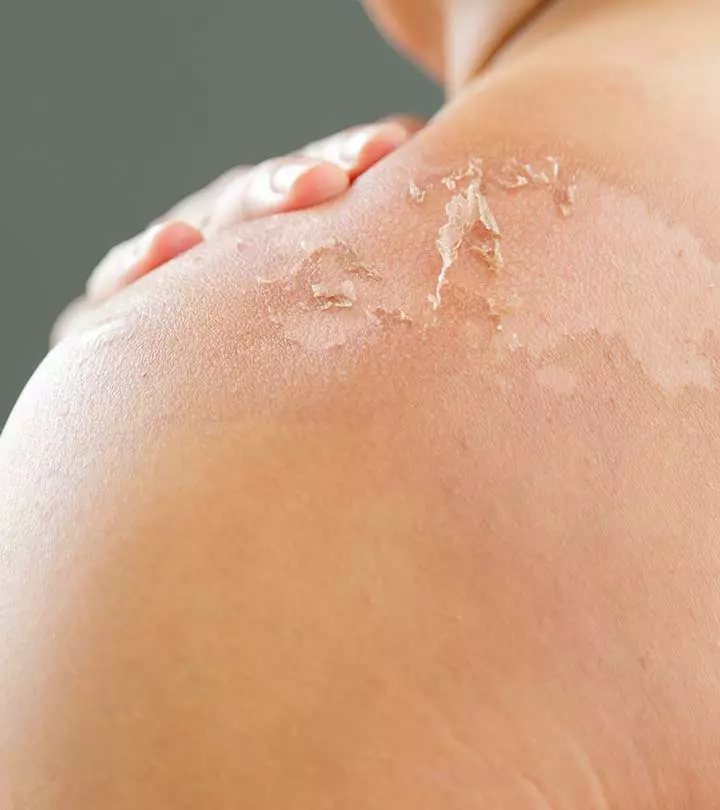
Image: Shutterstock
Do you look at your skin and see bits of it peeling off? Then chances are you have dry and scaly skin. Exposure to natural conditions such as the weather may interfere with the moisture content in your skin, leading to dryness. It may also be the symptom of a serious injury or a medical condition. If left untreated, it can lead to possible health complications. Read this article to get a deeper understanding of what is scaly skin, its causes, when to see a doctor, and the various treatment options available.
In This Article
What Is Scaling Skin?
Simply put, scaling skin is cracked, dry, or flaky skin. Also known as desquamation, scaly skin develops when the outermost layer of the skin called the epidermis starts to dry off. Commonly seen on the face, hands, and legs, scaly rashes can make a person feel conscious and embarrassed. Skin renewal is part of the body’s natural process of getting rid of old skin cells and generating new ones. The epidermis contains natural oils which help retain the moisture in your skin. But damage to this layer or the skin renewal process can result in dry and flaky skin.
Let’s head onto the next section to explore the causes behind scaly skin patches
Key Takeaways
- Scaling skin is cracked, dry, or flaky skin that develops when the outermost layer of the skin starts to dry off.
- Psoriasis, eczema, athlete’s foot and actinic keratosis are some medical conditions that may cause scaling skin.
- Scaly skin may also be a result of dry and cold weather, excessive use of skincare and beauty products containing harsh chemicals, or exposure to allergens.
- A quickly spreading scaly skin or nausea and fever accompanying scaly skin requires medical attention.
What Causes Scaly Skin?
White scaly patches on your skin can be due to multiple factors. Dry and cold weather is one of the most common causes of scaly skin. Low humidity in the air reduces the function of the skin barrier and increases susceptibility to injuries. This may lead to your skin drying out (1). Exposure to common allergens and using products high in chemicals may result in an allergic reaction. Scaly skin may also be a symptom of the following medical conditions.
1. Psoriasis
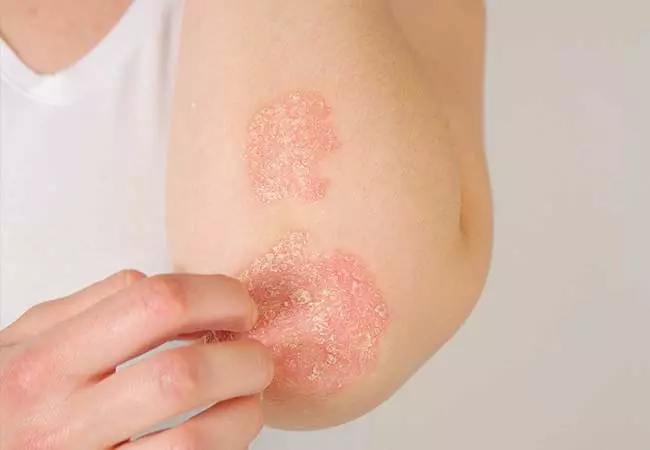
Psoriasis is a dermatological condition characterized by itchy, scaly patches on your knees, elbows, and scalp. Diagnosed equally in men and women, a genetic history, stress, and infections have been attributed to the development of psoriasis (2).
A 2021 study published in the Frontiers in Medicine journal analyzed data from the Global Burden of Disease (GBD) 2019 study. It estimated that there were 4,622,594 incident cases of psoriasis globally in 2019, with an age-standardized incidence rate of 57.8 per 100,000 people, which marked a decrease of 20% from 1990.
Below are the symptoms associated with psoriasis (3).
- thick, red plaques
- silver-colored scales
- itchy skin
- burning sensation
2. Eczema
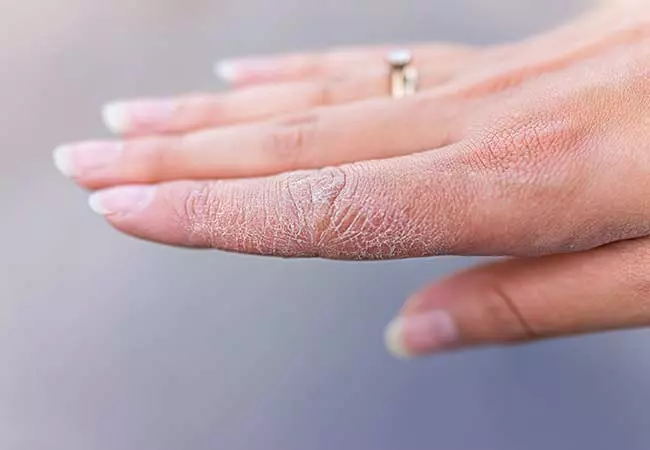
Also known as atopic dermatitis, eczema is a chronic skin disease commonly seen in children. Dry skin is a symptom commonly seen in eczema. This is due to the dysfunction of the skin barrier which is responsible for retaining moisture. Although the definitive cause of eczema is currently unknown, researchers suggest that it is a combination of genetics and environmental triggers (4). The symptoms associated with eczema are (5):
- itchy and dry skin
- scaly patches on face, knees, and elbows
- erythema – skin rashes
- thickening of skin
- pityriasis alba – dry, pale patches on the face
3. Actinic keratosis
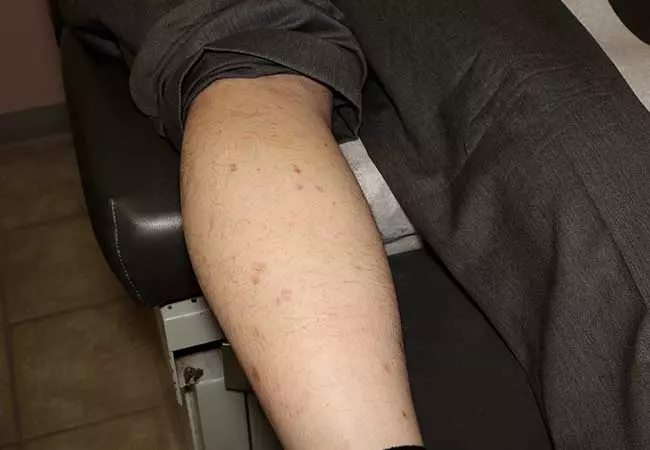
Actinic keratosis is a skin disease that has characteristic symptoms such as rough, scaly lesions all over the neck, face, hands, and legs. Caused due to prolonged exposure to ultraviolet rays, actinic keratosis may be the precursor to skin cancer (6). Symptoms associated with actinic keratosis are (7), (8):
- Rough, scaly patches
- Ulcers
- Burning sensation
- Bleeding
- Itchy papules or nodules
4. Athlete’s Foot
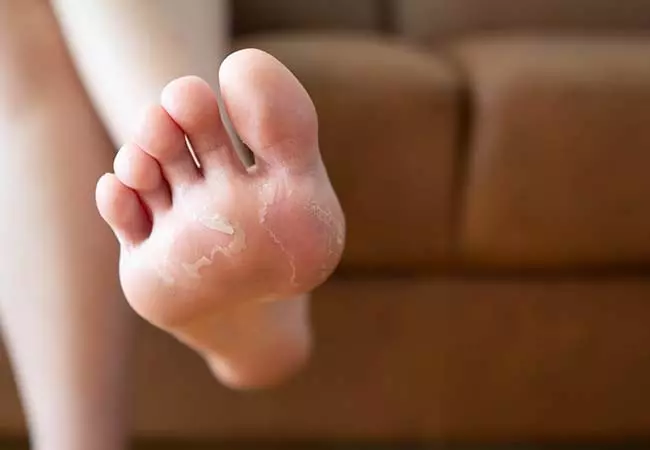
As the name suggests, athlete’s foot is a disease commonly found in people from athletic or military backgrounds. Also known as tinea pedis, this condition is caused due to fungal infections. The symptoms include (9), (10):
- White, scaly skinbetween the toes
- Red blisters on the foot
- Itching and burning sensation
- Soggy skin
- Pain
- Difficulty walking
 Did You Know?
Did You Know?5. Contact Dermatitis
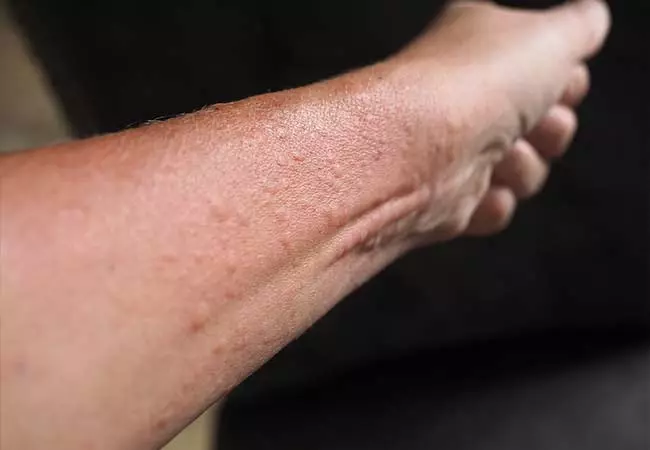
Have you ever used a detergent or skincare product, only to see your skin filled with angry rashes? If so, it may be a case of contact dermatitis. The chemicals present in the products modify the protein structure which leads to the inflammation of the skin. This condition may also cause dry itchy skin, making the affected areas feel uncomfortable and irritated. The clinical manifestations of this condition are (12):
- Tenderness
- Dry scales
- Pus-filled blisters
- Hyperpigmentation
- Flaky crusts over your skin
6. Seborrheic Dermatitis
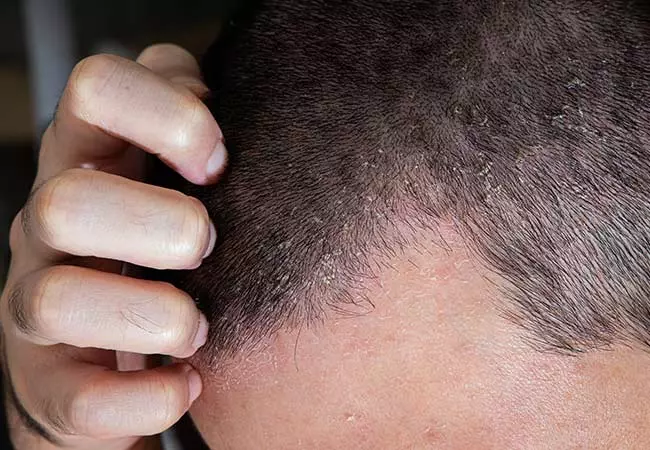
Seborrheic dermatitis is a chronic skin condition commonly diagnosed in infants and adults aged between 30 to 40 years. While researchers aren’t completely sure of the exact cause, few factors may play a role in its development. Individuals with HIV, exposure to Malassezia fungus, and Parkinson’s disease have been linked with the risk of developing this condition. Some of the symptoms include (13):
- Yellow scales on the face, forehead, back, and upper chest
- White flaky scales on the scalp
- Itchy skin
- Dandruff
 Did You Know?
Did You Know?7. Thyroid Problems
Thyroid problems may contribute to dry and scaly skin (15). Hypothyroidism or an underactive thyroid may lead to reduced oil production. This may cause dry and scaly skin. On the other hand, hyperthyroidism or an overactive thyroid may accelerate skin cell turnover, resulting in flakiness, skin peeling, and itching (16). Additionally, thyroid imbalances can impact sweat gland function, affecting skin hydration.
Some of the symptoms associated with thyroid problems are (16):
- Dry, flaky skin
- Itching or irritation
- Redness or inflammation
- Patches of rough, scaly texture
- Peeling or cracking
These skin changes are often associated with other symptoms like fatigue, weight fluctuations, and hair loss, highlighting the interconnected nature of thyroid health and the skin.
While having dry scaly skin is quite common, leaving it untreated may lead to possible health complications.
What Are The Potential Complications Of Scaly Skin?
Scales on your skin make your skin vulnerable and increase the risk of developing an infection. This may lead to the development of serious health complications. Research suggests that actinic keratosis may be a precursor to squamous cell carcinoma (7). Prolonged exposure to ultraviolet radiation leads to a change in the molecular structure, thus increasing the chance of developing skin cancer. Studies have also shown that 20%-30% of psoriasis patients develop joint inflammation called psoriatic arthritis (2). Recognizing other symptoms along with scaly skin is necessary for timely medical intervention.
When Should You Visit a Doctor?
While scaling skin rarely is a cause for concern, if you experience any of the following symptoms accompanied by scaly skin, consult a doctor immediately.
- If the scales begin spreading to other parts of your body.
- There is no improvement despite regular skincare.
- You have trouble breathing
- You develop a high fever
- There is a sudden development of blisters
- You feel very nauseous
A few simple tips can help prevent you from developing scaly skin patches.
How To Prevent Scaling Skin
If your scaly skin is due to dry and cold weather, you can follow these simple tips to keep your skin nice and healthy.
- Avoid taking baths in very hot water.
- Pat dry your skin with a clean towel to avoid infection.
- Apply lotions or moisturizers to keep your skin healthy.
- Avoid using products with harsh chemicals in them.
While these simple tips may help prevent scaly skin in general, there are some conditions that require proper medical treatment. The next section explores the different treatment options available for scaly spots on your skin.
Treatment For Scaling Skin
The line of treatment for scaly skin depends on the cause behind it and the severity of the symptoms. Scaly skin due to contact dermatitis can be treated by avoiding contact with the allergen which may reduce the symptoms. For serious skin conditions like eczema, psoriasis, or seborrheic dermatitis, application of prescribed topical creams with retinoids and anti-inflammatory properties can help alleviate the symptoms. Depending on the severity of the symptoms in athlete’s foot, your doctor may prescribe over-the-counter antifungal medications to address the condition.
Making small lifestyle changes, along with using topical treatments, may help improve the condition of scaly skin. These simple habits can support healthier skin from within the body..
Lifestyle Changes
- Drink more water to keep your skin hydrated from within.
- Eat foods rich in omega-3 fatty acids like fish, nuts, and seeds for skin nourishment.
- Maintain a balanced diet by consuming plenty of fruits and vegetables.
- Reduce stress through relaxation techniques like yoga or meditation.
- Get enough sleep to allow your skin time to repair and regenerate.
- Avoid smoking, as it can dry out and damage your skin.
Scaly skin can be caused due to a variety of circumstances. Dry, scaly skin is a typical symptom of various illnesses, including serious medical conditions like psoriasis and eczema. If you have scaly skin due to dry, cold weather, you can keep it moisturized and healthy by following the easy steps listed above. The severity of the symptoms and the source of scaling determine the course of treatment. It can be treated using thick ointments or lotions in mild cases. However, scaling that is more extreme may require medical care.
Frequently Asked Questions
Is Vaseline good for scaly skin?
Applying Vaseline is good for scaly skin. It helps seal moisture and improves skin texture.
What vitamin is good for scaly skin?
Vitamin C may be a good option for treating dry and scaly skin.
What deficiency causes scaly skin?
Biotin deficiency can cause scaly skin.
Does drinking water help scaly skin?
Drinking water helps hydrate the body and improves overall health. However, there are not enough studies to support its efficacy in treating scaly skin.
Can scaly skin be a sign of a more serious condition?
Yes, scaly skin can be a symptom of underlying issues like eczema, psoriasis, or fungal infections. It’s best to consult a doctor if the condition worsens or persists.
Watch how this YouTuber bravely navigates her life with ichthyosis or scaly skin, as she shares her social challenges and inspires with her resilience and grace. Hit the play button to learn how to manage this condition.
References
Articles on StyleCraze are backed by verified information from peer-reviewed and academic research papers, reputed organizations, research institutions, and medical associations to ensure accuracy and relevance. Read our editorial policy to learn more.
- The effect of environmental humidity and temperature on skin barrier function and dermatitis
https://onlinelibrary.wiley.com/doi/abs/10.1111/jdv.13301 - Psoriasis
https://www.ncbi.nlm.nih.gov/labs/pmc/articles/PMC4109580/ - Diagnosis and management of psoriasis
https://www.ncbi.nlm.nih.gov/labs/pmc/articles/PMC5389757/ - Eczema
https://www.ncbi.nlm.nih.gov/books/NBK538209/ - Atopic Dermatitis: Natural History Diagnosis and Treatment
https://www.hindawi.com/journals/isrn/2014/354250/ - Actinic Keratosis
https://www.ncbi.nlm.nih.gov/labs/pmc/articles/PMC4217291/ - Actinic Keratosis: Review of the Literature and New Patents
https://www.researchgate.net/publication/235884563_Actinic_Keratosis_Review_of_the_Literature_and_New_Patents - Actinic keratoses: review of clinical dermoscopic and therapeutic aspects
https://www.sciencedirect.com/science/article/pii/S0365059619301424 - Athlete’s Foot
https://www.ncbi.nlm.nih.gov/labs/pmc/articles/PMC2907807/ - Managing athlete’s foot
https://www.researchgate.net/publication/347214707_Managing_athlete%27s_foot - Athlete’s foot: overview
https://www.ncbi.nlm.nih.gov/books/NBK279549/ - Contact Dermatitis
https://www.ncbi.nlm.nih.gov/books/NBK459230/ - Seborrheic Dermatitis
https://www.ncbi.nlm.nih.gov/labs/pmc/articles/PMC2888552/ - Seborrheic dermatitis: overview
https://www.ncbi.nlm.nih.gov/books/NBK532846/ - Thyroid hormone action on skin
https://www.ncbi.nlm.nih.gov/pmc/articles/PMC3219173/#:~:text=Thyroid%20hormone%20is%20an%20important,notably%20on%20the%20extensor%20extremities.&text=Xerosis%20may%20resemble%20an%20acquired,soles%20may%20be%20quite%20dry. - Dermatologic manifestations of thyroid disease: a literature review
https://www.frontiersin.org/journals/endocrinology/articles/10.3389/fendo.2023.1167890/full
Read full bio of Donna Kay Parrish
Read full bio of Eshna Das
Read full bio of Ramona Sinha
Read full bio of Swathi E











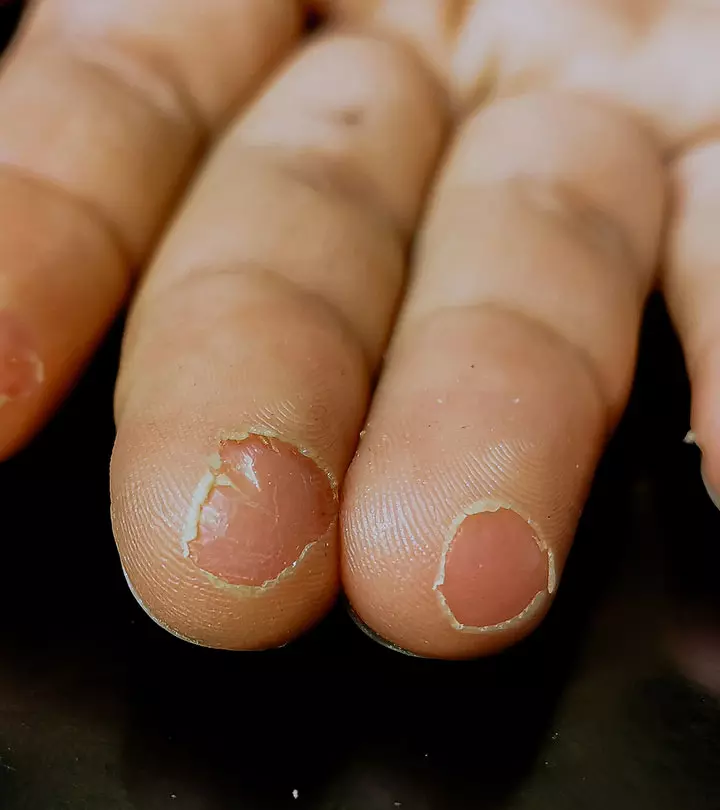

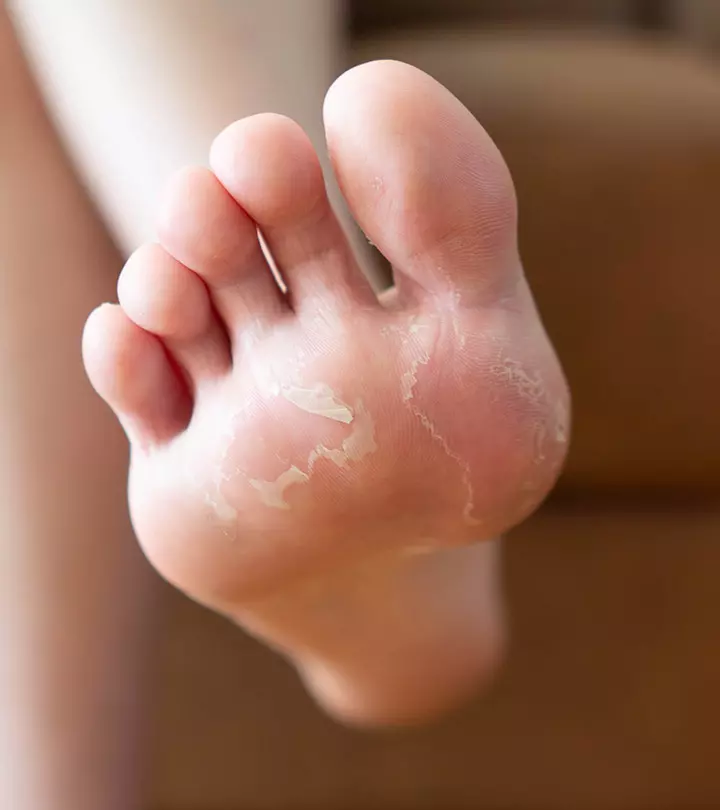




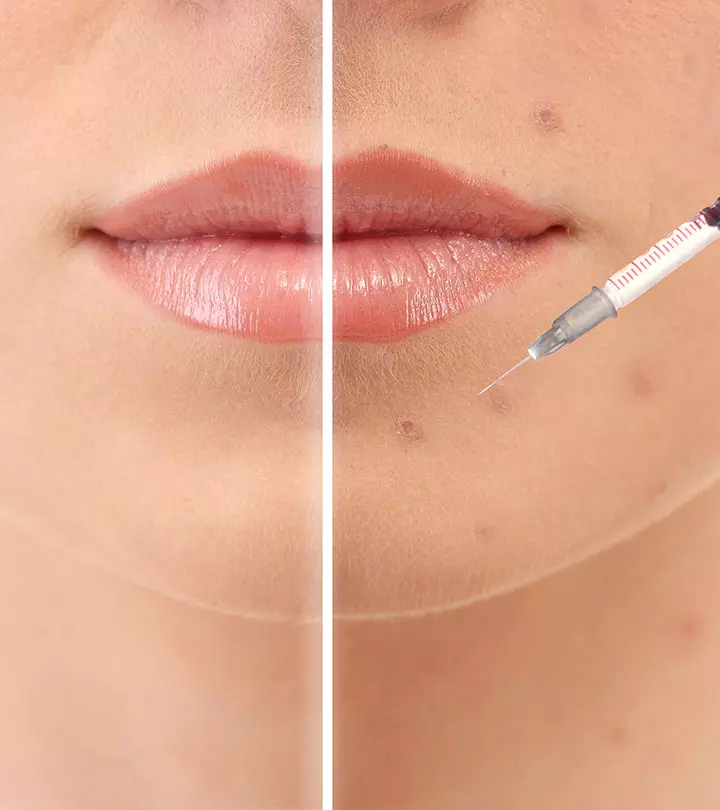
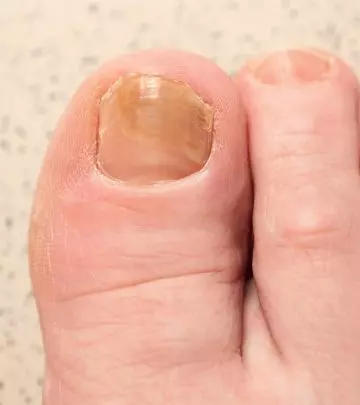








Community Experiences
Join the conversation and become a part of our empowering community! Share your stories, experiences, and insights to connect with other beauty, lifestyle, and health enthusiasts.